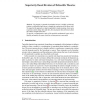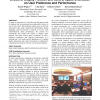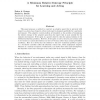241 search results - page 2 / 49 » Relational preference rules for control |
TWC
2008
13 years 5 months ago
2008
This paper analyzes distributed asynchronous power and rate control for wireless ad hoc networks. Importantly, all network transmitters are considered to be independent of any mana...
RULEML
2010
Springer
13 years 3 months ago
2010
Springer
We propose a systematic investigation on how to modify a preference relation in a defeasible logic theory to change the conclusions of the theory itself. We argue that the approach...
CHI
2006
ACM
14 years 5 months ago
2006
ACM
In many environments, it is often the case that input is made to displays that are positioned non-traditionally relative to one or more users. This typically requires users to per...
LPAR
2004
Springer
13 years 10 months ago
2004
Springer
The extended answer set semantics for simple logic programs, i.e. programs with only classical negation, allows for the defeat of rules to resolve contradictions. In addition, a pa...
CORR
2008
Springer
13 years 5 months ago
2008
Springer
This paper proposes a method to construct an adaptive agent that is universal with respect to a given class of experts, where each expert is designed specifically for a particular...



